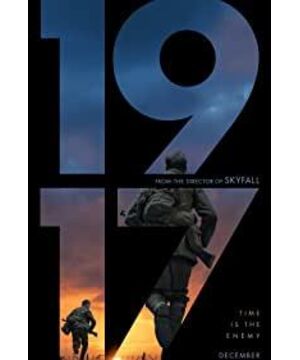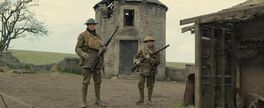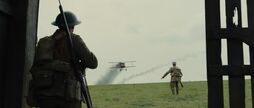"1917" is a dialogue between Sam Mendes and the First World War using the art of film. It was not only Sam Mendes who had a dialogue with World War I. That means that the film cannot be a slaughterhouse, nor can it be a trash can into which everything can be thrown. His choice is to start with a single step, face it, collide, and traverse it.
In 2018, at the end of the First World War a hundred years ago, Peter Jackson used the color and 3D documentary film "They Are No Longer Growing Old" to pay tribute to his grandfather, a new recruit who was indistinct. The form and style complement each other. Movies that talk about World War I, as well as the classic "Commissioned Army", "I Accuse", "The Great Phantom", "No War on the Western Front", "Road to Glory", and "Merry Christmas" and "War Horse" after the new century. ", "Franz." The reverberations, disputes, or silences of each dialogue constantly remind mankind that the start, process, and results of the world war for fantasy are so absurd that we can better understand the world we live in.
The listing of so many titles is also to prevent "1917" from being summarized as a long shot, a VR game, a war, and a result. One day that year, two randomly selected people, with frontline orders that were no bigger than horseshoe prints, were quickly caught up in mud and dirt and murderous intent. I firmly believe that, as an audience, you should be like a young messenger protagonist, passing through one World War I film after another. Only in this way can you understand that "excellent" is the worst adjective for this kind of film.
In front of the war on the Western Front, known as the meat grinder, the task of sending letters during the day was nothing more than using a spoon to dig out an escape tunnel under the cell floor. So, whether a soldier can still experience life and death as a person instead of a killing machine that pulls the trigger, this is what "1917" wants to express, and the inevitability revealed in contingency. He is not brave, nor does he have high enthusiasm. How he treats his companions, faces enemies, encounters strangers, from one message to another, this is the story of "1917".
Nolan used the sea, land and air of "Dunkirk" to edit the World War II tense of the anti-drama climax. What "1917" does is the 119 minutes you feel in the cinema, as close as possible to the real time and immersive experience on the battlefield. The four words in a mirror are considered to be the best commercial selling point on the poster. The soldiers attacked and the camera moved. The soldier fell, and the camera lowered. The soldier fainted, and the camera turned shady. The real time has accumulated to a certain extent, and the audience gradually regards the camera as the third person, and they seem to be on the scene, walking with the lively soldiers with childish faces. As a result, the soldier no longer falls down as a number, but the heavier weight of life on his arms, the unbearable pain of life.
The sense of form in one mirror rejects the large-scale impression of past war films. There is no tension and excitement of "prepare to kill more Germans", but God bless you better not to meet any Germans. The lens is inseparable from people, which means that its perspective and field of vision are not much different from what the protagonist sees and hears. A line of war that stretches for hundreds of kilometers, only showing what one person sees, is inevitably cramped and easily turned into repeated speeches. In order to avoid the exhaustion from one corpse to more corpses, "1917" provides different map models like building an RPG (role playing) game. From one trench to another, there are no man’s land, craters, bunkers, river ditches, trestle bridges, farms, ruins, and woods in the middle. Soldiers are highly vigilant, and spectators can open the map together under the fog of war to maintain a sense of novelty and attention. force.
The protagonist of "1917" crawls out of the trench with resistance, bad luck, and fear. The psychological dodge is also reflected in the face-to-face encounter with the German soldiers or the encounter with the corpse. They are also afraid of the death god who is holding a sickle and waiting for the harvest. As the enemy German soldiers, they were blurred. Just like the retreat of the protagonist, the Germans will also expose the deep struggles of human nature in an instant, the survival instinct and the fear of death collide with each other. The portrayal of being too human is not to make the British army look more civilized, but to illustrate another group of soldiers who are also at a loss on the opposite side of them. Bullets do not have eyes, and death is everywhere.
If there were only corpses all over the field, the movie would be a nightmare at best, an imaginary hell scene. When you find that you have a companion and encounter a living enemy, it turns out that this place is still the world. This is where the horror of the night of ghosts is.
The beauty of this dialogue with the First World War is slowing down and silent. "1917" is not to tell the story of an escape from a catastrophe. In the two sections of drifting on the hillside grass and ruins, the protagonist and the audience are aware of the moment of peace in the world, and at the same time produce the horror of war and the good interweaving emotion of being alive. There is a kind of sadness, is not saying a word.
When a soldier's life falls and fades like petals, his face is pale, and his voice is gradually faint and inaudible. You know the fear in his voice, think of his brother and his family, and understand his concern. You can't help noticing that something was really smashed at that moment. One person will continue to run with the care of the other person.
When the two armies fought and charged head-on, "1917" allowed the protagonist to run a route that had nothing to do with winning or losing the war (the message was to stop the offensive). He is crossing the battlefield, and he is also crossing history. I remember a director said that those who cannot be heroes illuminate our lives. On the cold and terrifying battlefield, he is like a rolling flame, as a stand-in for today's mankind in the peaceful era, to complete the mission of salvation.
Published in "China News Weekly", please do not reprint or embezzle
View more about 1917 reviews










